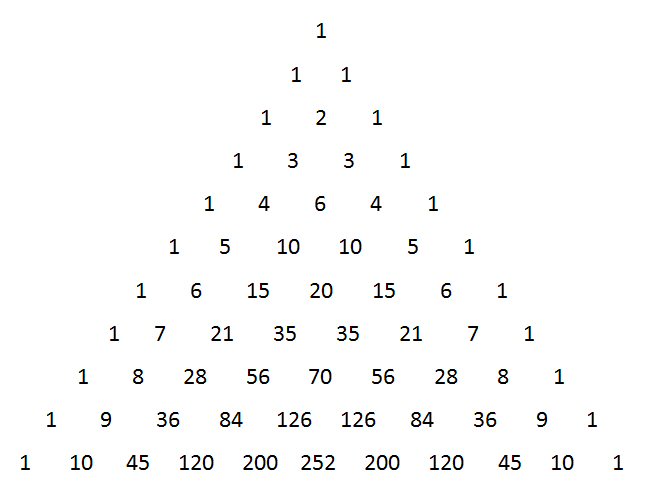degree of the polynomial function that generates the data shown to the right?
X=-3, -2, -1, 0, 1, 2, 3
Y=-1, -7, -3, 5, 11, 9, -7
-1, -7, -3, 5, 11, 9, -7
-7-(-1)=-6, -3-(-7)=4, 5-(-3)=8, 11-5=6,
9-11=-2, -7-9=-16
-6, 4, 8, 6, -2, -16
4-(-6)=10, 8-4=4, 6-8=-2, -2-6=-8, -16-(-2)=-14
10, 4, -2, 8, -14
4-10=-6, -2-4=-6, -8-(-2)=-6, -14-(-8)=-6
-6, -6, -6, -6
what is degree of 3, cubic polynomial
write a polynomial function in standard form with the given zeros.
-2,2,3
x-(-2)=0, x-2=0, x-3=0
P(x)=(x+2)(x-2)(x-3)
(x2-2x+2x-4)(x-3)
(x2-4)(x-3)
what is x3-3x2-4x+12
use long division to find the quotient and remainder for the problem
4x2+23x-16 by x+5
x+5/4x2+23x-16 4x(x+5) 4x2+20
-4x2+20x 3(x+5) 3x+15
3x-16-3x-15
-31
what is quotient:4x+3, remainder:-31
if p(x) is a polynomial of degree n is greater than or equal to 1, then p(x)=0 has exactly n roots including multiple roots and complex roots
what is the fundamental theorem of algebra
 state the image
state the image
what is Pascals Triangle
end behavior of the graph?
y=-4x3+2x2+7
a=-4 n=2
max:2-1=1
what is up and down
the minimum of f(x)=3x3+x2-5x
what is (0.64, -2.0)
simplifies the long division process for dividing by a linear expression x-a
what is synthetic division
y=2x2
0=2x2
0=x2
x=0
what is one real zero
expand the following
(a+b)6
1 6 15 20 15 6 1
what is 1a6+6a5b1+15a4b2+20a3b3+15a2b4+6ab5+1b6
write polynomial in standard form and classify by degree and number of terms
3x+9x2+5
what is quadratic trinomial
the maximum of f(x)=3x3+x2-5x
what is (-0.86, 3.1)
if you divide a polynomial p(x) by x-a then the remainder is p(a)
what is the remainder theorem
1. use a graphing calculator to find any real roots
2. factors out linear factors use synthetic division
3. use the quadratic formula to find complex roots
4. state zeros
what are the steps in finding all zeros of a polynomial function
(a+b)n=P0an-1b+P2an-2b2+...+Pn-1abn-1+Pnbn
what is the binomial theorem
if a is positive and n is even what is the end behavior?
what is up and up?
this happens when a graph has multiple zeros
what is that graph will change direction at that zero
when you divide p(x) by x-a, then a is a zero of p(x) if the remainder is zero and x-a is a factor
what is the division algorithm for polynomials
y=x2+4x+3
y=(x+3)(x+1)
x+3=0 x=-3
x+1=0 x=-1
what are two real zeros
coefficients of the 6th row in Pascals Triangle
what is 1 6 15 20 15 6 1
if a is negative and n is odd what is the end behavior?
what is up and down
write the following in the factored form
x3-2x2-15x
x(x2-2x-15x)
what is x(x-5)(x+3)
check if the first polynomial is a factor of the second polynomial. if it is then write a new polynomial as a product of two factors
x4-1; x5+5x4-x-5
x4+0x3+0x2+0x-1; x5+5x4+0x3+0x2-x-5
x4+0x3+0x2+0x-1/x+5x5+0x4+0x3+0x2-x-5
1x(x4+0x3+0x2+0x-1)
x5+0x4+0x3+0x2-1x
5(x4+0x3+0x2+0x-1)
5x4+0x3+0x2+0x-5
what is yes (1x+5)(x4-1)
y=x2+2x+3
x=-2+-the square root of 22-491)(3)/2(1)
-2+-the square root of 4-12/2
=-2+-the square root of -8/2
=-2+-ithe square root of 8/2
=-1+-1ithe square root of 2
what are no real zeros
expand (2x-3)3 using binomial theorem
1 3 3 1
1a3+3a2b1+3ab2+1b3
1(2x)3+3(2x)2(-3)+3(2x)(-3)3+1(-3)3
what is 8x3-36x2+54x-27